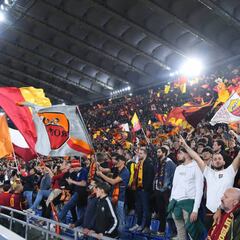Interview with Aleksander Ceferin: UEFA president discusses Champions League, Super League, Financial Fair Play, VAR and handball
UEFA President Aleksander Ceferin spoke to AS in his office in Ljubljana to discuss some of the hottest topics in European soccer, including the Super League proposal.
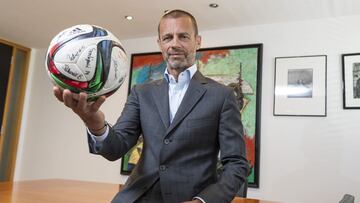
Q:Let’s start with the Champions League - the semi-finals, the quarter-finals and the round of 16 have all been spectacular, which is what everyone wants…
A: Yes, this is the Champions League, and it’s the biggest promotion for football [soccer]. It’s the best sports competition in the world. And when you see these matches, it’s unbelievable, and I’m happy that we changed the away goals rule. When I said that to some of my colleagues, they said there would be more penalties, but it’s not true, and you saw it. The matches, in my opinion, are more interesting nowadays for the top clubs. All the clubs in the Champions League are top clubs, and playing away is almost the same as playing at home. So I’m looking forward to the final.
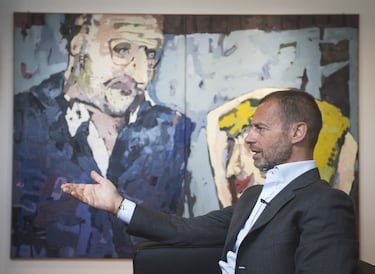
Q: It seemed like an inevitable English final, but Real Madrid manages to always be there…
A: You’ll have to ask them how it’s possible, but for me, one of the most underrated players ever is Benzema. He’s an amazing player. And they have Luka Modrić, who, the older he gets, the better he gets. And they are an experienced team. So you could say they have been a bit lucky in some matches, but you can only be fortunate in one game. Playing like that and coming back like that it’s amazing.
Q: It’s interesting what you said about Benzema because a lot of people think like this - that he’s not had the recognition he deserves.
A: Now, he’s becoming more and more recognised. He was always in the shadow of someone. And it’s amazing how this guy can score. He finds a way, even when it seems impossible to score. He’s an impressive player.
Q: For the first time, UEFA is going to give free tickets to the finalists…
A: We wanted to show the fans that we respect them, that we missed them during the pandemic, and that we are happy that they are still loyal to football. I think we have to pay our respect. It’s costing us a lot of money, but this is worth doing. We knew it before, and now it is even more obvious - football is about fans and players. All the rest is just the supporting team around them, including me. I don’t pretend to be the star because I’m not. It is sad to see empty stadiums and hear the shouting of goalkeepers and coaches. It’s just not the same game. So we wanted to do something symbolic, to show fans that we are there for them.
Q: The fans are so important in football. A year ago, we had the Super League case, and you recently said that the Spanish fans and the Italian fans are not as strong as the English fans. Why did you say that?
A: I didn’t say they are not so strong. These days some media don’t even read the original interview and share fake news. Look, this project - which I am quite fed up with talking about because it doesn’t exist anymore - would absolutely ruin football. When I saw the reaction of English fans, I was impressed. Fans in France and Germany didn’t have to do anything because their clubs didn’t participate. And I was a bit surprised by the fans’ soft reaction in Spain and Italy, although I do understand it. Sometimes these things go a bit slower in some countries, and since the Italian teams and Atletico Madrid quickly abandoned the project, there was not enough time to have a stronger reaction from the fans. I was surprised by the lack of reaction from Barcelona’s fans, as I always considered it a people’s club.
Q: Not Real Madrid?
A: Barcelona is known as the club of the people… I don’t know how many members we are talking about, but fans used to go to the General Assembly and give their say on decisions. But, this time, their reaction was not very strong. But now it doesn’t matter anymore.
Q: What’s your memory of those days?
A: It was stressful for two or three days. It was surprising that the same people, who unanimously supported something, had already signed up for something else. But, in a way, I’m glad that it happened because it was always in the air. When it finally came out, we finished once and for all that nonsense of an idea that football can be bought, that football is just for the elite, just for the rich. That will never happen. Some people warned me that the same people killed basketball, but I said: “Basketball is not football. It will never be football.” Football is part of our history. It’s part of our traditions. It’s part of us. We could never have the ticket prices for UEFA Champions League more expensive than they are now. Or as expensive as they are for the Super Bowl, for example, even though the Champions League is a bigger event. That is because football belongs to all the fans, and no one should take it away from them.
Q: Did you try and talk to them, or did they try and speak to you?
A: No. No, they didn’t. When you do something like this, it makes more sense for them to approach us than the other way around. But they never did. The only ‘greetings’ UEFA got from them came from courts, as they tried to challenge us everywhere. We never said they could not play in their own competition, because they can if they want. But it’s funny that these were the clubs who applied first for a place in the Champions League. If they play something else, they cannot play in our competitions. That is not a monopoly. They can create their own UEFA and do whatever they think is right. You know, I showed them a lot of respect in the past. I don’t want to speak about the chairman of Juventus, but in my relationship with him, I was very open and honest. I never said this before, but I also invited the President of Real [Madrid], Florentino Pérez, to Nyon before any of this happen to speak about the future competitions. He cancelled the meeting with a text message just 24 hours before because of what he called “an event related to basketball”. With Bartomeu, I never spoke. In a way, he was already on his way out of the club. So they all had a chance to speak, and we have never been aggressive or arrogant. The announcement of that project was an act of unbelievable arrogance from their side, which is probably why they don’t want to communicate with UEFA. But that never influenced how we treated them in our competitions. You can see from their success - Real Madrid will play the Champions League final and Barcelona Women’s Champions League final. That is a clear signal that our competitions are healthy, fair and correct.
Q: Is the relationship not good with them?
A: We have formal professional ties with the clubs as we do with every club which plays in our competitions. So I wouldn’t drag clubs into this, as they are much bigger than their presidents, the same way UEFA is bigger than its President. But, indeed, our personal relationships do not exist. As I said earlier, they were only communicating via courtrooms, and it is up to our lawyers to deal with that.
Q: Can you understand how two rivals like Real Madrid and Barcelona think the same way? Because they are historic rivals, but they agree on this.
A: Is it the relationship between the clubs or the personal relationship between the two presidents? You’ll have to ask them if they will tell you. But there is probably some common interest behind it. I don’t know, and I don’t care how close they are. That is not important to me. Football must remain open for everyone, and we will not step back one millimetre to defend the European Sports model. What they want is their own thing, and they are free to meet and do whatever they want.
Q: The Spanish court decided in your favour so that you can start disciplinary proceedings. Is that a possibility?
A: Yes, of course. It’s possible. But let’s see what happens. We just got the decision. We are glad that it finally came. I was shocked by the behaviour of the previous judge - we were not even offered a hearing; we just received the decision with precautionary measures. Now, finally, we had a proper hearing, and these measures are lifted in their entirety. I trust the Spanish authorities and courts. Let’s see what happens.
Q: But it wouldn’t be good for UEFA either…
A: What wouldn’t be good for UEFA?
Q: To have two of the biggest teams out of your competitions…
A: The most important thing for UEFA is to show that the rules are the same for everyone. The moment we have different rules for the big and small teams, we can close the door. And I think this is the most important thing - everyone has to respect the regulations, and everyone has to respect the others. Out of 247 ECA members, 244 clubs are on the same side as us, which means something.
Q: What do you think about the summer tournament they are preparing in the United States among themselves?
A: They can play in summer, or winter, or autumn, or spring. They can play whenever they want, and I don’t care if they do. They can also play the rebel tournament and not the Champions League if they want it. That might happen in the future, so I don’t mind. They must think that we are more focused on them than we are. And, trust me, we are not. If you feel so important that everything revolves around you, something is wrong. In football, everything revolves around the ball.
Q: Are you confident about the European Tribunal Decision? Do you think UEFA will win the judgement?
A: First of all, I’m absolutely sure that we don’t have a monopoly. Everyone can choose to be a member of UEFA - national associations can choose to be members of UEFA or not, clubs can choose to play our competitions or not, and they can choose to play their own. When it comes to this case, everyone is on our side. I don’t see anyone who would say it differently. Fans are clearly on our side. All the football family, maybe for the first time in history, stood against this - clubs, national associations, leagues, FIFPro, players, coaches, European authorities, and governments. We all understand what the European Sports Model means, and European football is so strong because of it. None of these rebel clubs has a team full of players from their own country, nor a team full of players raised in their youth categories. Without open competitions, football would be gone. I care for football too much to see it happen. I will always love this game, even when I am done with this role. And I hope everybody feels the same way about this beautiful game. I know I will feel the same even in 30 years.
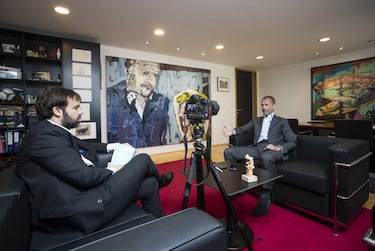
Q: The new Champions League is the future. What about the format with the “Swiss” model? Do you think the fans understand it?
A: It’s always a bit problematic when the competition is changing. We have to explain things better to the fans. Otherwise, they will figure it out on their own, but it might take some time. The proposed format is a bit more complex than the current model, but it will be more competitive and exciting, and I think it will be good for the competitive balance. It is a league system that, I believe, is much more interesting than the current one. Despite the old saying that you shouldn’t fix what is not broken, and the Champions League is not broken, we can and we will make it even more interesting.
Q: Two places will be decided by the UEFA coefficient, which is controversial because people don’t understand how possible to give two direct places to clubs which failed to qualify for the competition…
A: No final decision has been made yet on access lists, and that was just one of the proposals. But the more we’ve thought about it, the more we are convinced that we know the right thing to do. We’re still discussing it with our stakeholders, and it might not end up in that direction. The coefficient relates to your performances in UEFA competitions, but such a system might not be fair to the smaller teams who finally obtained a good position in their league. So, we are still considering our options and seriously discussing them.
Q: Another thing is the final four. Is that a possibility?
A: The final four might be an option, but the problem is that it would lead to fewer matches, as the semi-finals would only have one leg. That means fewer business opportunities for clubs and broadcasters, too. But we’re thinking of a great idea, which is just a bit too early to share with the public. We need more time to finalise it before talking about it. We could do something similar, but we need a bit more time to develop it.
Q: Will we have the Champions League on Thursdays? And also, what about the option to have an opening ceremony game?
A: We don’t see the need for Champions League to be played on Thursdays. Perhaps during one week in the season but not all season long. On that day, we already have UEFA Europa League and UEFA Europa Conference League, both emerging as top competitions.
About the opening match - this was the idea of the chairman of the ECA, Nasser Al-Khelaifi, and I think it’s very good. We are thinking in this direction, to do something special for the beginning of the Champions League. But, of course, many questions still need to be discussed. For example, shall we only do it on one match, or how could it be done? But, we like the idea of starting the season with something big.
Q: So, when we will have news about the new Champions League?
A: Hopefully, around the Congress next week. We still have to settle some details, and then we might decide. But, at the latest, everything needs to be done by the end of the current season. And it will be.
Q: Another big thing is the new Financial Fair Play regulations. Is the thinking that if you have more revenues, you are stronger…
A: Even now, if you have more money, you’re more powerful. You can ask your clubs about that. But the fact is that this is the first time that the leagues, ECA and UEFA agreed on a system of financial sustainability, which means that it is fair to all the parties. I’m convinced that the idea is excellent. And sanctions will be heavy if something happens.
Q: What do you think about the State-owned Clubs?
A: Are you talking about Spanish clubs or some other clubs?
Q: Other clubs. Or if you know any Spanish club...
A: You know, this is a populistic statement. Owners, if they respect the rules, can run their club. Now, many governments have many clubs across Europe in different forms. So each club should try to do their best and focus on winning the competitions instead of discussing other clubs and their owners. If they follow regulations and their respective country’s legislation and don’t have a criminal background, it doesn’t matter who the owner is. It is pure populism, the same as the discussion about traditional and non-traditional clubs. It is complete nonsense. Things in the world are changing. Traditionally, all presidents of UEFA came from big countries. Some people don’t like such changes.
Strong owners mean better sustainability for football. They can finance youth and women’s football, and more can be invested in football development, amateur football, etc. So complaining about someone just because you think you could lose a match against them is not correct.
Q: But there’s a problem because UEFA banned Manchester City but after that the Court of Arbitration for Sport found in favour of it. So now UEFA has its rules, but the clubs can go to the CAS and win the cases.
A: As a lawyer, I know everybody can go to court and have a chance to win the case. If a police officer in Spain sanctions you, you can go to court, and you might win. That is why we are now changing the rules. These rules should help us avoid situations like those you refer to in the future. Still, I think we have more than 95% or more success rate at the Court of Arbitration for Sports. But then some cases are more interesting for the media, and when UEFA loses, that’s always news.
Q: The most recent decision from UEFA against Russia. Do you feel that’s logical with the situation?
A: The situation is difficult, and we couldn’t do it differently. Although in a way, it breaks my heart to sanction the athletes because it’s not their war. It’s not good that they suffer because of this. But from the other point of view, in such a terrible situation, we have to help. We have to do our part to finish this craziness as soon as possible.
Q: So the British option for Euro 2028 is on its own now?
A: No, Turkey declared bid for both 2028 and 2032. So, you have Turkey and UK bidding for EURO 2028 and Italy and Turkey for EURO 2032.
Q: Three important disciplinary cases are now in Spain, and one of those is the PSG situation in the Bernabéu with Nasser and Leonardo. Why are there no sanctions? Why are they not banned?
A: As much as I know and think it was published, UEFA opened the disciplinary proceedings after the game. Now it is up to an independent disciplinary committee to deal with the case and decide. I do not know at which stage the process is, and I don’t want to know. It wouldn’t be correct for me to ask about ongoing cases. I never did it, and I will never do it.
Q: What do you think about the Eintracht fans’ attendance in Barcelona in Europa League? How is it possible that there can be more visiting fans in the rival team’s stadium?
A: Maybe they should focus more on how they are selling tickets than on the fallen Super League. Selling tickets at this stage of competition remains with the clubs. I don’t know how they do it and what they did in this case. But it seems that all the fans at the stadiums had entered with valid tickets. If this happened during one of our finals, we would be under pressure. I got a message from a famous coach whose name I will not disclose because it was a personal text asking me how such a thing is possible. I told him to ask Barcelona.
Q: Atlético fans are unhappy with the decision to close part of the stadium because of the Nazi salutes of some of them…
Again, I cannot comment on a disciplinary case. But I can say that no sanction is strong enough for Nazi messages on a football match. People who promote such ideology should be banned from the stadiums forever, not just for one game. And I am not referring myself to this case, as I don’t know the details. I am talking about the principle. It is an absolute no-go for me. Of course, some people might not be happy with this and, to be clear, I do not care if they are happy or not.
Q: Is the Spanish and Portuguese candidature for the World Cup in 2030 the only option for Europe. Do you think it’s a strong bid?
A: Yes. I said at the beginning that I wanted one European bid, and it happened. Therefore, I can say that all the 55 federations from Europe will fully support the joint bid of Spain and Portugal.
Q: Do we have a chance of winning?
A: I would also say ‘we’ because it’s Europe. I am sure we will win. You have good odds when you start with a 55-0 advantage.
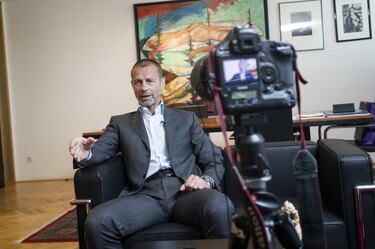
Q: Are you happy with the failure of the biennial World Cup? You were against it from the beginning.
A: It was a nonsense of an idea. The idea was never discussed adequately with confederations in advance; instead, they went straight to the media. I spoke a lot about it, and everyone from the football and the sports community was against it, although they tried to present it differently. And now I’m glad that FIFA also understands that was not a good idea. So as much as I know, it’s gone. So, of course, I’m happy because it will not happen.
Q: There is another problem in the future: the 24 Club World Cup of Infantino. UEFA has a lot to say on the matter because the best teams in the world are European.
A: We agreed in Miami, I think it was in 2019 or something, about this possible competition every four years. Twenty-four teams, eight European teams. We don’t have a problem with that. The problem was the lack of transparency. The problem was that there were 25 billion euros or dollars coming from somewhere all of a sudden. We asked who was doing the financing, but we never got an answer. Nobody wanted to tell us anything. And this is a problem. If there is a plan for competition every four years, it’s fine with us; we already supported it on FIFA Council. Now, are they planning to do it? And when? And if? I don’t know. It would be best if you asked FIFA.
Q: On the Nations League, you have an agreement with CONMEBOL. Is it possible that the South American teams can play in the Nations League in the future?
A: Yes, it’s possible. But we’re not so far along yet. We opened a joint office in London, and we started to cooperate. As you know, we will play the Finalisima in June, and we will see what we can do club-wise. We will collaborate on the refereeing matters, too. In fact, we already are doing it - at the EURO 2020, Argentinian referee Fernando Andres Rapallini officiated three games, while Spanish referee Jesús Gil Manzano was appointed for Copa America. There are many great things that we can do with youth and women’s competitions. I think it is great. European and South American teams don’t play each other enough because there are not many opportunities to organise friendlies with the Nations League.
Before the World Cup, big European teams want to play against Brazil, Argentina, and others. These matches would be an even more significant advantage for South American teams because Europe has more quality teams - Spain, France, Germany, Portugal, Italy, the Netherlands, England, Belgium... the list is long. There are only ten teams in South America, four strong ones and two very strong.
Q: They need it more than UEFA?
A: Probably yes, but we also want it, and I’m glad we are working closely with CONMEBOL to find solutions. I’m pleased that we have this cooperation. It was something that existed in the past, but then everything stopped for a few decades already. So we’ll do even more with them in the future.
Q: What about VAR? In Spain, we feel that it’s working better in European football than in Spain. How is that possible that we have two different kinds of VAR?
A: Yes, VAR functions very well in UEFA competitions. At the EURO it was very good, same in the Champions League and Europa League. Of course, in our competitions, the referee on the pitch is the one that makes the decisions. But it doesn’t mean he needs to check all the situations all the time. Our refereeing unit, led by Roberto Rosetti, has instructed our referees to use it only when necessary, and all the decisions are taken on the pitch. The only thing where I have some doubts is the handball rule. We have witnessed many strange situations, like when the ball hits a player in the head and then glances at the player’s arm... Otherwise, the rest works quite well. I didn’t follow the use of VAR in Spain, but the level is rising each season in European competitions.
Related stories
Q: On handball, I think people don’t understand it, and it’s a rule that’s essential for football.
A: I fully agree with you. And the rule that every hand is a handball if you score after it, it’s a bit strange. For example, Luis Figo told me once that if such a rule existed when he was a player, he would have taken advantage of it by kicking the ball onto the opponent’s hand because he knew how to do it. It is hard for players if every contact with the hand is handball. Where should they put their hands? You cannot play with your hands behind your back. So, there is a lot of work to do, and we need to discuss it more. But ultimately, the Laws of the Game remain with IFAB.

